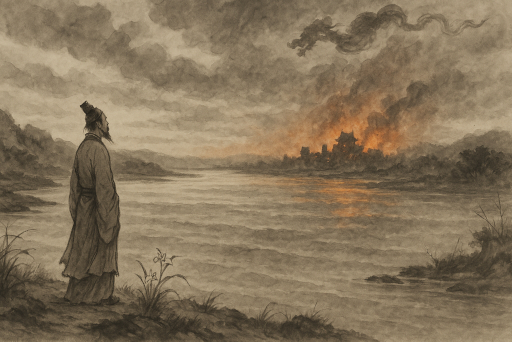The Dragon Boat Festival
By Jacek
May 28, 2025
By Jacek
May 28, 2025

The Dragon Boat Festival (Duānwǔ Jié, 端午节), celebrated on the fifth day of the fifth lunar month (falling on May 31 in 2025), is one of the most important holidays in the Chinese calendar. Its cultural and emotional significance rivals that of the Chinese New Year (Chūn Jié, 春节) and the Mid-Autumn Festival (Zhōngqiū Jié, 中秋节) [1].
This tradition, known for its dragon boat races and the eating of rice dumplings called zōngzi (粽子), originated from the legend of Qū Yuán (屈原) — a poet, patriot, and tragic hero of the Warring States period (Zhànguó Shídài, 战国时代; 475–221 BCE) [2].
During Qū Yuán’s life (339–278 BCE), the Zhōu dynasty (周) was in decline. The feudal system weakened central authority, leading to continuous conflicts among states such as Qín (秦), Chǔ (楚), Zhào (赵), Hán (韩), Wèi (魏), Qí (齐), Yān (燕), and Sòng (宋) [3].
Born in the state of Chǔ, Qū Yuán served as a high-ranking official and advisor to King Huái Wáng (怀王). A reformist, he promoted the rule of law, morality, and a strong military. He opposed alliances with the increasingly aggressive state of Qín, which aimed to expand its territory [2].
His firm loyalty to Chǔ earned him many enemies at court. Political rivals accused him of treason, and King Huái Wáng, succumbing to intrigue, exiled him. This loss weakened Chǔ’s internal stability; its treasury was drained, and the army’s quality declined. In 316 BCE, Qín conquered Shǔ (蜀) and Bā (巴), opening the path to invade Chǔ [3].
During his exile, Qū Yuán traveled through the country, witnessing the moral decay of elites and the suffering of common people. He wrote his greatest works then, including Li Sāo (离骚, “Encountering Sorrow”), an allegorical poem filled with pain, idealism, and personal despair. It marks the beginning of romanticism in Chinese literature, combining folklore, Confucian and Daoist philosophy, and introspection [4].
In 278 BCE, the Qín army, commanded by Bái Qì (白起), launched a two-pronged attack on Chǔ’s heartland. The royal mausoleums at Yílíng (夷陵) were burned, and the capital Yīng (郢) was captured [3].
Qū Yuán, deeply grieved by the fate of his homeland, wrote the poem Ài Yīng (哀郢, “Lament for Yīng”) as a protest against corruption and betrayal. After the capital fell, he committed suicide by drowning himself in the Mǐluó River (汨罗江). Legend says that locals raced in boats to save his body, beating drums to scare fish and throwing rice into the river to feed aquatic creatures and protect his remains — the origin of the zōngzi tradition [2].
These customs evolved into the spectacular dragon boat races and cleansing rituals to ward off evil spirits [1].
The International Dragon Boat Federation organizes global competitions and promotes the festival worldwide [8].
Qū Yuán’s literary and moral legacy remains timeless. In 2009, his story was inscribed on UNESCO’s Intangible Cultural Heritage list [9]. His works were compiled during the Hàn dynasty (汉朝) into the anthology Chǔ Cí (楚辞, “Verses of Chǔ”), foundational for classical Chinese poetry [4].
His life’s message formed in Li Sao— courage, loyalty to ideals, and readiness for sacrifice — continues to inspire:
"The road ahead is long and full of thorns, yet I shall seek the truth to the ends of the earth."
For his successful campaign, Bái Qì was honored with the title Wǔ'ān Jūn (武安君), meaning “Lord of Martial Peace.” Chǔ resisted for another 55 years but ultimately fell in 223 BCE. Two years later, in 221 BCE, Qí (齐) surrendered without battle, and King Zhào Zhèng (赵政) proclaimed himself the first emperor, Qín Shǐ Huáng (秦始皇), unifying China for the first time [3].